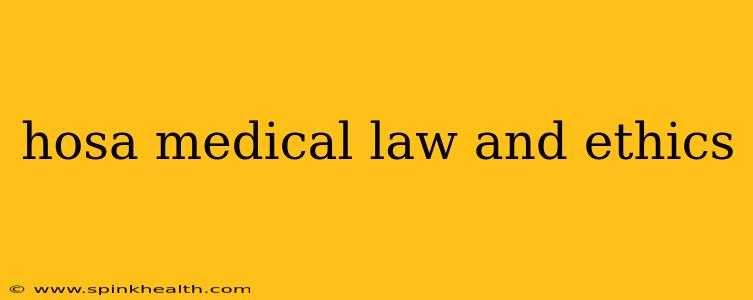The Health Occupations Students of America (HOSA) competition often features challenging events centered around medical law and ethics. This isn't just about memorizing legal jargon; it's about understanding the moral compass guiding healthcare decisions and the legal framework protecting patients and providers. This journey into the world of HOSA medical law and ethics will guide you through the key concepts and equip you with the knowledge to excel.
Imagine this: you're a young healthcare professional facing a complex ethical dilemma. A patient refuses a life-saving treatment due to religious beliefs, or perhaps a colleague is behaving unethically. Understanding medical law and ethics provides the framework to navigate these difficult situations responsibly and ethically. This isn't just about passing a test; it's about shaping your future as a compassionate and knowledgeable healthcare provider.
What are the Key Areas in Medical Law and Ethics for HOSA?
HOSA's medical law and ethics events cover a broad spectrum. Expect questions related to patient rights, confidentiality, informed consent, end-of-life care, and professional responsibilities. Let's dive deeper into some key areas:
What is informed consent, and why is it crucial in healthcare?
Informed consent is the cornerstone of ethical medical practice. It means a patient understands the risks, benefits, and alternatives to a medical procedure or treatment before agreeing to it. This isn't just a signature on a form; it's a conversation ensuring the patient is truly empowered to make their own healthcare decisions. A lack of informed consent can lead to legal consequences and erode the trust between patient and provider. Think about the implications: a patient might undergo a procedure they don't fully understand, leading to potential complications or regret. Informed consent ensures the patient's autonomy and protects them from harm.
How does HIPAA protect patient privacy?
The Health Insurance Portability and Accountability Act (HIPAA) is a federal law protecting the privacy and security of patient health information. It establishes strict guidelines on how protected health information (PHI) can be used, disclosed, and protected. This includes everything from medical records and billing information to conversations between a patient and their doctor. Violating HIPAA can lead to severe penalties, highlighting the importance of strict adherence to these regulations. Imagine the ramifications of a healthcare worker accidentally revealing a patient's diagnosis to an unauthorized person—it could have devastating consequences for the patient's life. HIPAA is designed to prevent precisely this.
What ethical considerations are involved in end-of-life care?
End-of-life care presents some of the most complex ethical dilemmas in healthcare. Questions around euthanasia, physician-assisted suicide, advance directives (like living wills and durable powers of attorney), and the patient's right to refuse treatment often arise. These decisions involve balancing the patient's autonomy, their quality of life, and the moral and legal obligations of healthcare professionals. Consider the emotional weight of making such decisions for a loved one or the moral implications for healthcare providers involved in end-of-life care. It's a delicate balance requiring careful consideration and ethical sensitivity.
What are the legal and ethical responsibilities of healthcare professionals?
Healthcare professionals have a broad range of legal and ethical responsibilities, including maintaining patient confidentiality, adhering to professional standards of care, and reporting suspected abuse or neglect. They are also expected to act with integrity, compassion, and respect for patient autonomy. This encompasses everything from proper documentation and adherence to protocols to reporting colleagues who are acting unethically or endangering patients. Failing to meet these responsibilities can have serious professional consequences, impacting their license and reputation.
How do you handle ethical conflicts in a healthcare setting?
Ethical conflicts are inevitable in healthcare. When faced with a situation where professional obligations conflict with personal values, a structured approach is crucial. This involves clearly identifying the ethical conflict, gathering relevant information, considering different perspectives, and consulting with colleagues, supervisors, or ethics committees for guidance. Remember, there isn't always a clear-cut right or wrong answer, but a thoughtful and ethical approach is always essential. This could involve mediating disagreements between patients and family members, or even reporting unsafe practices.
By mastering these key areas, you'll be well-equipped to navigate the complexities of HOSA's medical law and ethics events. Remember, it's not just about knowing the rules; it's about understanding the principles behind them and applying them ethically and responsibly in real-world scenarios. Good luck!

